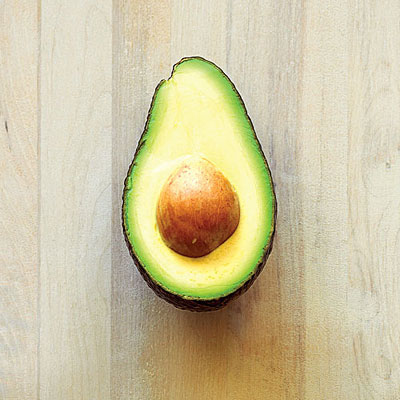Are you looking for more variety in your diet this year? For 2014, try adding some of these delicious, clean and healthy foods.
 1. Avocado
1. Avocado
At the top of the Environmental Working Group’s Clean 15, with the lowest amount of pesticide residue of any of 51 common fruits and vegetables, avocados contain antioxidants: vitamin C, vitamin E, phenols and carotenoids. A 2014 study showed that eating an avocado every day could reduce levels of LDL cholesterol.
An 8 year survey of American adults showed that people who eat avocados have a reduced risk of metabolic syndrome.
Quiz: Is Your Body TOXIC? Take the Test...
(get your free personalized report)
2. Pineapple
Also on the Clean 15 list, pineapple contains the enzyme bromelain. Studies in mice show that bromelain extract has an anti-inflammatory effect and relieves symptoms of allergy-induced asthma and inflammatory bowel disease. Pineapple is also an excellent source of vitamin C.
3. Sweet potatoes
Sweet potatoes are a fantastic source of antioxidants, including vitamin A, vitamin C and polyphenols. They also contain potassium, phosphorous, magnesium, manganese and B vitamins.
While sweet potatoes have a high carbohydrate content, they are also very high in fiber and contain more fiber than white potatoes. This means you digest the carbs in sweet potatoes slowly, and your insulin levels don’t fluctuate wildly. The complex carbs found in sweet potatoes are a healthy source of energy.
Sweet potatoes are low in pesticide residue.
4. Quinoa
People have known about the health benefits of quinoa for some time now. If you haven’t tried it already, don’t wait any longer. Quinoa is high in phenols and an excellent source of B vitamins, calcium, iron and magnesium. A versatile whole grain, it’s perfect for anyone avoiding gluten. You can use it in salads, pilaf and tabbouleh. Use it instead of breadcrumbs to add texture to veggie burgers.
Quiz: Is Your Body TOXIC? Take the Test...
(personalized report)
5. Plain Yogurt
Yogurt has become junk food. If you look in the dairy aisle, you’ll see yogurts in a wide variety of flavors, all marketed as being delicious while still good for you. Many have bright labels announcing they are low-fat or fat-free.
In fact, if you read the ingredients labels, you’ll find that many of these “healthy” yogurts are full of sugar, sometimes in the form of high-fructose corn syrup. These yogurts can also contain artificial colors and flavors.
Now, there are even super sweet yogurts marketed specifically for kids.
This doesn’t mean yogurt is bad for you. Plain yogurt, without any sugar or artificial ingredients, is wonderful for your health. Yogurt is a fermented food and can aid digestion, strengthen your immune system, lower your cholesterol and help your body rid itself of toxins.
You can add fresh fruit to give plain yogurt more taste. For a sweet treat, add organic honey, but remember that honey is sugar and too much of it can be unhealthy.
6. Beans
Beans are a wonderful source of plant-based protein. Unlike meat, they are low in saturated fat, which can increase your cholesterol levels and raise your risk of heart disease. Beans are rich in antioxidants. The high-fiber content of beans means they are slow to digest, so they prevent insulin spikes. Food high in fiber leave you feeling satiated, so you eat less.
Make sure your beans are dried, not canned. Salt and sugar is often added to canned beans, and the cans may be coated with BPA, which disrupts the endocrine system.
7. Almond Milk
Many people avoid dairy products, whether it’s because they have allergies to whey or casein, are lactose intolerant or disapprove of the treatment of dairy animals. In the past, soy has been a popular milk replacement.
Now we know that soy is not as healthy as we used to think it was. Soybeans are often genetically modified. In addition, consuming large amounts of soy might increase your chances of developing thyroid problems.
Almonds, on the other hand, are very good for you. They have one of the highest concentrations of vitamin E of any food. They also contain B vitamins, iron, calcium, magnesium, zinc, potassium, phosphorous and manganese. Eating almonds can reduce the risk of high LDL cholesterol and heart disease.
You can drink almond milk on its own, add it to tea or coffee and use it as a substitute for milk in recipes.
When you buy almond milk, check the label and make sure it doesn’t have added sugar or other unnecessary ingredients.
Additional Sources:
Avocado consumption decreases LDL particle number and small, dense LDL cholesterol in overweight and obese subjects, The Journal of the Federation of American Societies for Experimental Biology
Bisphenol A: An endocrine disruptor with widespread exposure and multiple effects, The Journal of Steroid Biochemistry and Molecular Biology
Bromelain exerts anti-inflammatory effects in an ovalbumin-induced murine model of allergic airway disease, Cellular Immunology
Crossover study of diets enriched with virgin olive oil, walnuts or almonds. Effects on lipids and other cardiovascular risk marker, Nutrition, Metabolism & Cardiovascular Diseases
Dose Response of Almonds on Coronary Heart Disease Risk Factors: Blood Lipids, Oxidized Low-Density Lipoproteins, Lipoprotein(a), Homocysteine, and Pulmonary Nitric Oxide, American Heart Association
Hass Avocado Composition and Potential Health Effects, Critical Reviews in Food Science and Nutrition
High doses of soy phytoestrogen are a risk factor in the progression of subclinical to clinical hypothyroidism, Clinical Thyroidology
Saturated Fats, American Heart Association
Treatment with oral bromelain decreases colonic inflammation in the IL-10-deficient murine model of inflammatory bowel disease, Clinical Immunology
